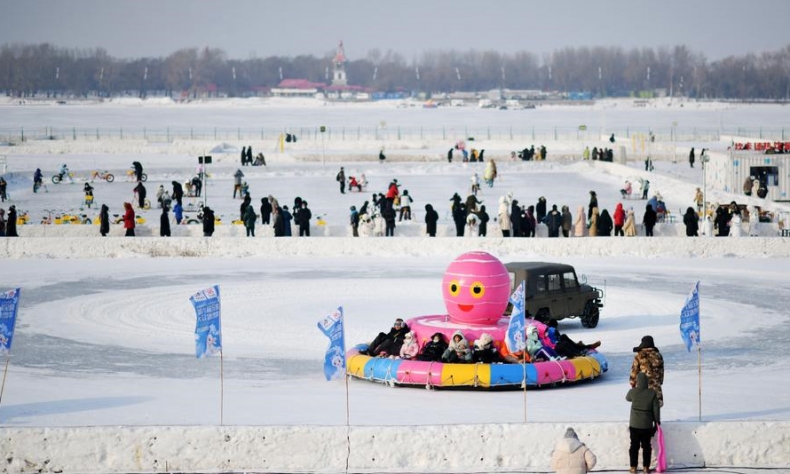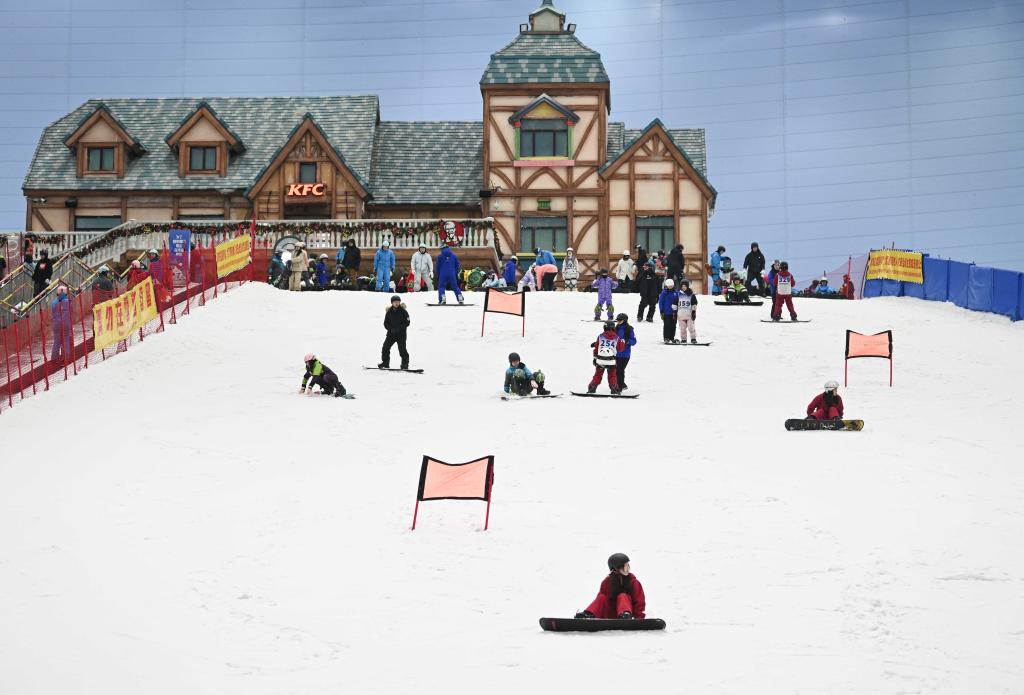White Gold

President Xi Jinping’s message at the Asian Winter Games shows China is seizing the opportunities presented by cross-border winter sports to promote economic growth and international exchanges.
The 9th Asian Winter Games, held in Harbin, Heilongjiang Province in northeast China, marked the second time China’s “Ice City” had the honor, and the third time for China. It was also three years since the Beijing Winter Olympics in 2022 that China hosted a major winter sports event. Over the years, China has made great efforts to use such events to bring over 300 million people to participate in winter sports, turning the ice and snow economy into another growth driver.
At the welcome banquet following the opening ceremony, Chinese President Xi Jinping commented on that, saying, “From the Olympic Winter Games Beijing to the Asian Winter Games Harbin, the passion in China for ice and snow has swept across the nation.”
A visionary strategy
Xi saw the potential and benefits of winter sports early on. Back in 2014, during a meeting with Thomas Bach, president of the International Olympic Committee, in Sochi, Russia, he said, “In China, winter sports do not extend beyond south of the Great Wall. If winter sports can be promoted south of the Great Wall, it is expected to engage 200 to 300 million people, thus igniting the torch of winter sports in China.”
The importance Xi gives to the development of winter sports can be seen from the fact that he conducted on-site inspection of the preparations for the Beijing Winter Olympics not once or twice but five times.
In March 2016, after listening to reports on the preparations for the Beijing Winter Olympics and Paralympics, Xi stressed, “We must consistently promote the popularization of winter sports, vigorously develop winter activities for the general public, improve competitive performance in winter sports, accelerate the growth of the ice and snow industry, advance winter public sports, and enhance people’s physical fitness.”
The Beijing Winter Olympics proved a resounding success and the work to promote winter sports continued. At the Beijing 2022 Winter Olympics and Paralympics Review and Awards Ceremony in April 2022, Xi outlined the plan to develop winter sports: “We will continue to make ice and snow sports more popular by strengthening strategic planning while building and making better use of sports venues and facilities. We will develop the winter economy and hold a wide range of ice and snow sports events to help maintain the general public’s enthusiasm for these sports.”
The efforts to promote winter sports have seen heartening results. According to official data, following the 2022 Beijing Winter Olympics, the number of participants in winter sports nationwide reached 313 million by April 2024, with a participation rate of 22.13 percent. In addition, the number of venues for winter sports in China has grown. By 2023, their number was 2,847, up 16.10 percent compared with 2022.

Winter sports is also attracting people from southern China, which has a warmer climate. For example, people flock to Guangzhou Bonski in Guangdong Province, the largest indoor ski resort in southern China, which opened in 2019. By the first half of 2024, it had received over 4 million visitors.
“We came from Hong Kong, it’s not far, and it’s very convenient to get here,” some domestic tourists told the local media. “There are many activities, and they’re all well-organized. We really enjoy coming here, and the food and accommodation are also very convenient. We basically come here once every month; we love the skiing atmosphere here.”
Ice and snow economy
Apart from strengthening people’s health, winter sports contribute to national economic growth. In March 2016, Xi said “Ice and snow are as valuable as gold and silver” at a panel discussion of the Heilongjiang delegation at the annual two sessions. “Green mountains and clear waters are as valuable as mountains of gold and silver, and so are Heilongjiang’s ice and snow.”
He reiterated this to Bach in 2022, adding that hosting the Beijing Winter Olympics has also driven the growth of winter sports industries and the ice and snow economy in China.
Heilongjiang, China’s northernmost province, is rich in ice and snow resources, and attracts a large number of tourists each winter. One of the most popular tourist destinations is the Harbin Ice and Snow World, the world’s largest ice-and-snow theme park with spectacular ice sculptures. Visitors marvel at them, taste the local food, and enjoy the light shows. In the 2023-2024 winter season, the province’s revenue from snow and ice tourism reached RMB 171.19 billion, a year-on-year increase of 553 percent.
The growth momentum for ice and snow tourism is strong nationwide. According to the 2025 China Snow and Ice Tourism Development Report released by the China Tourism Academy, in the 2023-2024 winter season, China recorded 430 million ice and snow leisure tourism trips, with a revenue of RMB 524.7 billion. In the 2024-2025 winter season, the number of ice and snow leisure tourism trips in China is expected to reach 520 million, with tourism revenue projected to exceed RMB 630 billion.
Ice and snow tourism is just the tip of the ice and snow economy. In September 2023, when Xi made an inspection trip to Heilongjiang, he said tourism with distinctive cultural features should be developed. The winter economy should be fostered as a new source of growth, promoting the overall development of sports, culture, equipment, and tourism related to ice and snow.

In November 2024, the State Council issued a guideline to stimulate the vitality of the ice and snow economy through high-quality development of winter sports. The guideline proposed 24 measures in eight areas to ensure that the ice and snow economy reaches a scale of RMB 1.2 trillion by 2027, and RMB 1.5 trillion by 2030.
At the 9th Asian Winter Games, calling Harbin the birthplace of China’s modern winter sports, Xi said, “We feel truly in here that ice and snow are as valuable as gold and silver. The ice and snow culture and economy are becoming a new driving force for the high-quality development of Harbin and a new bond linking the city and the world.”
International exchanges
He noted that the passion in China for ice and snow has invigorated winter sports around the world and pointed out that winter sports are fascinating because they require passion and collaboration. China has worked to strengthen international cooperation and exchanges on winter sports.
The 9th Asian Winter Games itself is a case in point. Over 1,200 athletes from 34 Asian countries and regions competed, including countries with little ice and snow like Cambodia, a record high in the Games’ history.
According to the head of Guangzhou Bonski, the resort attracts visitors from other cities in Guangdong as well as surrounding provinces, and even international tourists from Southeast Asia. In 2024, it received more than 100 international tour groups from Southeast Asia.
Winter expos are another way of developing the snow and ice economy. In October 2024, China hosted the eighth edition of the World Winter Sports (Beijing) Expo, which saw over 400 brands from more than 20 countries participating, including from Austria, Italy, Germany, and Japan.
Yu Zaiqing, a member of the International Olympic Committee and vice president of the Chinese Olympic Committee, said at its opening ceremony, “Winter sports, with their unique charm and wide participation, have become an important bridge for promoting international exchange and cooperation, as well as enhancing friendship among people.”
Ivo Ferriani, president of the International Bobsleigh and Skeleton Federation, called the Winter Expo a platform for international exchange.
The theme of the 9th Asian Winter Games – “Dream of Winter, Love among Asia” – embodies the shared aspiration and desire of the Asian people for peace, development, and friendship, Xi said at the Games. As China continues to drive the ice and snow economy, this aspiration and desire will be shared by the rest of the world.
 Facebook
Facebook
 Twitter
Twitter
 Linkedin
Linkedin
 Google +
Google +










